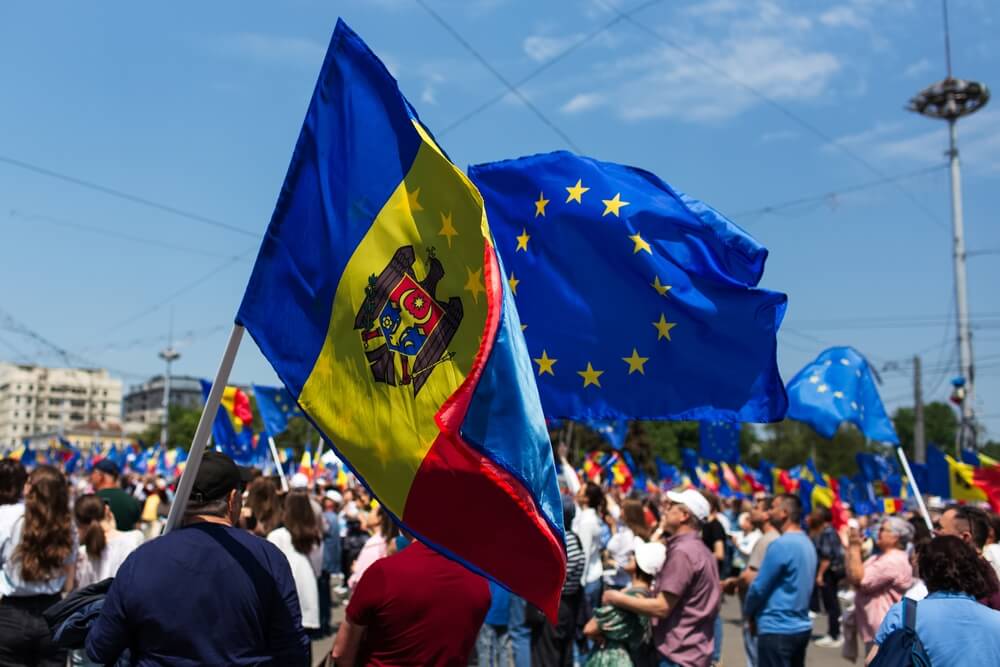Russian state media have vented their fury over the court ruling in Moldova sentencing the governor of the Gagauzia region, Yevgenia Gutsul, to seven years in prison.
"Pablo Escobar probably got less," they quoted a supporter of the convicted regional leader in Moldova. Ms Gutsul (38) was convicted of funnelling Russian funds into financing the strongly pro-Russian Shor party, which was later banned.
The top Russian state administration is no less annoyed. Commenting on the ruling, Foreign Ministry spokeswoman Maria Zakharova said that "European anti-values are in action" and that Brussels is forging a liberal dictatorship.
And indeed, this is a harsh blow to the pro-European government in the former Soviet republic of Moldova regarding the extremely strong pressure from Moscow to stop its endeavours towards the West.
The ruling against the local leader is also highly symbolic, as the Gagauzia region in the south of the country is strongly pro-Russian and does not agree with the course taken by the government and President Maia Sandu towards EU membership.
In last year's referendum on EU membership, 95% of Gagauzian citizens voted against it.
The arrest of the tycoon
The arrest of the richest Moldovan and former politician Vladimir Plahotniuc at the end of July shows that a conflict of major significance is underway in Moldova ahead of the parliamentary elections in September.
He was arrested in Athens at the request of Interpol while he was on his way to Dubai.
His role in the early years of Moldova's democracy is highly controversial, and apart from being linked to fraud and money laundering worth up to $1bn, Plahotniuc is considered one of Russia's most important assets in Moldova.
The pro-European authorities in Moldova seem determined to limit Russia's influence on the outcome of the forthcoming parliamentary elections
Although his arrest and extradition were requested not only by Moldova but also by Moscow, this was considered an attempt to provide their associate with protection and refuge from persecution, not to convict him.
Moscow cannot stay calm about these cases, as they show that the pro-European authorities in Moldova seem determined to limit Russia's influence on the outcome of the forthcoming parliamentary elections on 28 September.
Decisive elections
In many ways, these elections are crucial for both sides and will be the final chapter of the electoral "trilogy" in which Moldovans will decide whether to stay in Russia's embrace or turn to the EU.
In the first two chapters, the second option prevailed, albeit very narrowly. In the simultaneous presidential elections and referendum on EU membership in October 2024, support for European policies and President Maia Sandu's new mandate was very narrow.
Such a result gave Moscow the expectation that it would be able to stop the trend of Moldova's distancing and its rapprochement with Europe in the parliamentary elections.
Thus, Russia is repeating the pattern of strong pressure and massive interference in the electoral process that it used in Moldova and neighbouring Romania last year by favouring pro-Russian candidates.
The most important vehicle in the political race was to be the pro-Russian party coalition Victory Bloc, founded by Ilan Shor, a pro-Russian politician living in exile. However, on 3 August, the state electoral commission suspended the participation of four political parties in the elections, including Shor's Victory Party.
Moscow will particularly target the Moldovan diaspora in Europe
In addition, Moscow will rely on hybrid pressure, which includes the financing of pro-Russian activists and candidates as well as a series of disinformation operations.
Moscow will particularly target the Moldovan diaspora in Europe, who overwhelmingly supported the European option in last year's referendum and presidential elections.
This time, the Russian strategy aims to demotivate Moldovans in the diaspora, with 60% of them residing in Western Europe.
"The campaign is designed to demobilise diaspora voters—encouraging them to stay home—and to manipulate those who do vote into supporting a fake pro-EU force," national security adviser Stanislav Secrieru told Politico.
Has the EU done enough?
While Russian efforts are already clearly visible, the biggest dilemma ahead of the election will be whether the European Union has made even one counter-effort to keep Moldova in its orbit.
There has been no shortage of political statements from Brussels regarding Moldova. At the beginning of July, the EU-Moldova summit was held in the capital, Chisinau.
 European support for Moldova will be put to the test as Russia tries directly and seemingly even harder to crush the pro-European movement in the small Eastern European democracy
European support for Moldova will be put to the test as Russia tries directly and seemingly even harder to crush the pro-European movement in the small Eastern European democracy
It was meant to reaffirm the strong European will to keep the country on the European path, given that the EU only holds summits with major partners such as the USA and China.
Moldova was also granted a massive financial aid package, totalling almost 2 billion euros over the next few years. The EU is also supporting the country in the fight against Russian disinformation campaigns.
However, the pro-European forces in Moldova cannot be completely reassured by this, as European reservations about Moldova's membership are still very much present.
As in the case of Ukraine, which sees Moldova as a partner with which it is moving towards membership of the Union and with which it wants to move into the "fast lane", European reluctance centres on the inadequate fight against corruption and the weak rule of law, accompanied by a shaky economy.
European support for Moldova will therefore be put to the test over the next month and a half as Russia tries very directly and seemingly even harder to crush the pro-European movement in the small Eastern European democracy.